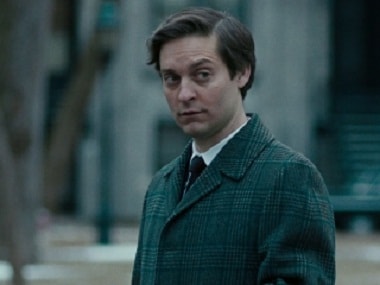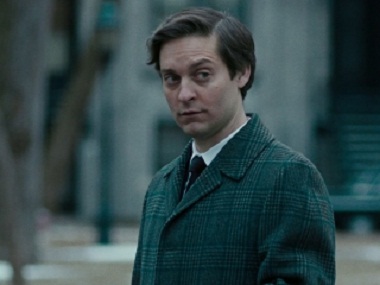Somewhere near the middle of Pawn Sacrifice, a chess player tries to explain what makes the game so maddening. “This game, it’s a rabbit hole,” he says. “There are more 40-move games than there are stars in the sky.” Edward Zwick’s film about the madness and genius of chess world champion Bobby Fischer is a walk into that rabbit hole, holding Fischer’s hand. Smartly-plotted, brilliantly enacted and beautifully filmed, this is one of the most sensitive portraits of brilliance and delusion. At the same time, it’s also a classic American sports tale, about an underdog who wants to beat the frontrunner. Even if you can’t tell queen from rook, Pawn Sacrifice will still grip you from its opening scene. All over the world, the media is talking about that temperamental American, Bobby Fischer (Tobey Maguire), who didn’t show up for his game against his Soviet adversary Boris Spassky (Liev Schrieber) at the World Chess Championship in Reykjavik. Is he scared of Spassky? Is this just another prank from Fischer who keeps making outrageous demands? From the way the journalists speak of Fischer, you can tell they think he’s just being a prima donna. [caption id=“attachment_2439636” align=“alignleft” width=“380”]  A still from Pawn Sacrifice.[/caption] Except he isn’t. Against the cool, blue Icelandic landscape, we see a remote house. Inside, Fischer is sizzling with paranoia and anxiety. He’s torn his room apart, looking for listening devices and there’s terror in his wide-eyed stare. Bradford Young’s clever and artistic camerawork creates a wonderful sense of intimacy. You feel the fear and dread that’s swelling inside Fischer even though you know he’s delusional. Over the course of Pawn Sacrifice, you sympathise and empathise with Fischer, and even though he’s difficult and unpleasant, you desperately want him to win the chess games because you know Fischer has lost the fight against sanity. Writer Steven Knight does a masterful job of touching upon important details in Fischer’s life. We’re taken back to 1951, when Fischer was a boy in Brooklyn. Brought up by a mother who was proud of her Russian heritage, Fischer knew he was under surveillance from an early age. This was the starting point of what would eventually blow up into delusions, anxiety, paranoia and a persecution complex. Initially, though, Fischer is all about drive and genius. A gifted chess player who hates draws, he quickly rises up the ranks. Fischer keeps winning tournaments and develops a fascination for Soviet champion Boris Spassky who becomes World Champion in 1969. The two rarely encounter each other in tournaments and after some twists and many steps further down the rabbit hole of madness, Fischer decides he wants to go head to head with Spassky. Backing him is lawyer Paul Marshall (Michael Stuhlbarg) and the American government, who want to give the Soviets a drubbing on the chessboard and score a symbolic win in the Cold War. Fischer starts competing in tournaments and as he plays, he also mentally unravels. No one lets him take a break, no one listens to his sister pleading to let her take him to a doctor. Why? Because when Fischer does show up and when he does play, his moves are miracles. “It would be like pouring concrete in a holy well,” says his coach Bill Lombardy (Peter Sarsgaard). This is an intriguing story that’s made gripping by Zwick’s masterful direction and the extraordinary performances that he gets out of his immensely talented cast. Maguire is incandescent as Fischer and despite being the film’s producer, he doesn’t whitewash Fischer in order to get sympathy. His Fischer is a brat, ungrateful, disturbed and trying – but we still care for him. Sarsgaard has a small role as Lombardy, who had the distinction of having defeated both Spassky and Fischer at one point. He’s able to capture Lombardy’s admiration as well his helplessness against Fischer’s unravelling. You’ll find yourself wishing there was more of Sarsgaard in the film. In an even smaller role is Schrieber. He has barely any lines as Spassky and the dialogues he does speak are in Russian. Yet with little more than silence, sunglasses and his body language, Schrieber establishes Spassky’s personality beautifully. It’s a brilliant performance, particularly because of how little time Schrieber has on screen. One of the most striking shots in the film shows Fischer standing at the edge of a cliff, a tiny figure against the immense beauty of Iceland’s hilly landscape. It communicates perfectly the solitude that Fischer feels and how close he is to tipping over into the madness that fringes his mind. A madness that is born of the times he lives in, of the politics in the air and that is held at bay only when he’s on the black and white, rule-bound battleground of chess. Knight’s screenplay balances Fischer’s life and the Cold War era on the pivot of the World Chess Championship. Spassky and Fischer faced one another in a series of games to establish which of them would be World Champion. The title means different things to different players in Pawn Sacrifice. The game may officially be between Spassky and Fischer, but Soviet and American governments are playing their own games as are inner demons and old fears. But just when you’re ready to hate the American government for sacrificing Fischer’s sanity to one-up Russia in the cold war, Knight and Zwick let us peek into Spassky’s life as a chess player. Suddenly, what’s between Spassky and Fischer is as much competition as kinship. Don’t miss this film. As bad moves go, that would be the worst.
Even if you can’t tell queen from rook, Pawn Sacrifice will still grip you from its opening scene.
Advertisement
End of Article


)
)
)
)
)
)
)
)
)



